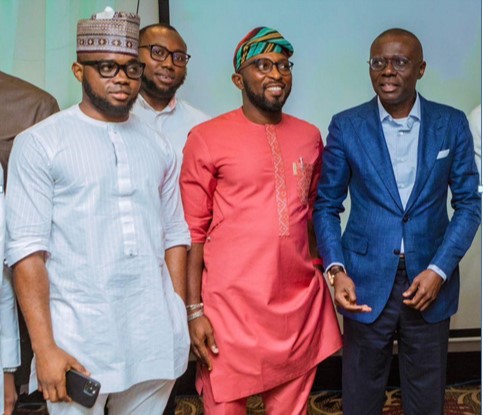Sponsored: One June day in 2020, during the peak of the COVID-19 lockdown in Nigeria, Toheeb Dele-Balogun was speaking to several young creative people at the annual Pitcher Festival’s Future Creative Leaders Academy (FCLA) seminar in Lagos, Nigeria. This demographic, most of them students of renowned universities in Nigeria, including universities of Ibadan, Lagos and others, logged into a digital conference room in their hundreds to watch the then 34-year-old creative director of The hook, a fast-rising creative agency.
His presentation, titled “The Truth Will Set You Free”, was his first public dig at the industry-spread misconception that creative advertising and lies go in tandem. Before then, he had repudiated the thinking at his agency and at Orange Academy, a brand school where he teaches advertising storytelling; the work ethics of young creatives and the fanciful notions that “advertising is ‘bobo’”. His years-long focus on nipping anti-truthful advertising crusades in the bud led him to a discovery he had previously overlooked — the issue of rampant talent leakage in the creative industries. This, he enthusiastically presented to the Governor of Lagos, Babajide Sanwo-Olu, during a state-hosted meet and greet on Thursday, December 8, 2022.
Dele-Balogun always wears a matter-of-fact face, acetate spectacles sitting high on his nose bridge and a starched Zanna cap that seldom leaves his head. He is unmistakably traditional in his formality, donning a white kaftan with rolled-up sleeves as against a conforming shirt-and-blazer look. In front of the podium, he guided his audience through his slides with the zing of an experienced salesperson. His preferred type of public appearances are in gatherings, “like this one where innovators and government officials come together to chart the course for an impactful future, no matter how difficult the actions might be,” he said. Contrary to what many people think, he argued, Lagos State, and Nigeria at large, is witnessing a talent crisis. The reason is that “we’re too focussed on the talents leaving the country, rather discovering and nurturing the ones still here.” This, he explained, is why the success of creative talents from certain geographical areas and demography has become “accidental” and unpredictable.
In the year 2021, Mavin singer Boy Spyce rose to fame when his freestyle video went viral. He would later be admitted to the Mavin Music academy after which he was signed under the record label. Controversial singer Portable became a sensation after his viral freestyle on TikTok, what followed was the release of his hit song “Zazu Zeh”, a series of features and an album release. Singers Raybeka and Lade also had their moments of virality with “Ex-Boyfriend” and “Adulthood na Scam” that propelled them into the public eyes. Another trend, which thankfully is gradually fading, is of visual artists making images of famous people and tagging them on the internet in the hope of a viral moment that would mark the beginning of their success. Dele-Balogun said these examples, even if they are successful, are proof of “our broken talent discovery and transfer system. If we had to wait for viral moments to discover the next superstars then we’re not doing well at all.”
“There are many other talents still hawking plantain and pure water out there,” he explained, the point is not that when creative talents are discovered and nurtured they must succeed, but “to make sure that when they are discovered, they don’t just fizzle out and back into the street, hustling for scraps. Creative people don’t necessarily have to be regional or national stars before they’re able to make better lives for themselves. We can create structures for them in their communities that will enable them to monetise their creative outputs”.
Dele-Balogun’s parents have lived in Lagos for as long as he can remember. Growing up in the Ajegunle-Apapa area, he was exposed to the diversity of creative talents in his immediate environment. A chunk of those talents never reached their potential. Toheeb spent most of his after-school hours in his father’s shop. It was where he learned to not only tell stories, but to use the stories he came up with to sell.
He wanted to share several proposals with the governor and his team, including one that enables creative people at the grassroots to grow: First, within their immediate locality; second regionally; and nationally at a scale that can almost be predictable. “We’re tapping into our talent pool in Lagos with a basket and you know what happens every time we do that? A lot of talents leak through those holes and are wasted,” he claimed, “private citizens have been doing it; they look within and support a talented individual until they grow. But the impact of this, while it might be great for the chosen talent, is too insignificant for the state. We need to discover, nurture and transfer talents at a much more profitable scale, that way the government can generate revenue and create diverse revenue streams.”
After spending the last few years teaching at Orange Academy, Dele-Balogun is musing on a long-lasting solution to the talent leakage problem. He’d sometimes discuss it with his partners Adebayo Owosina, Sam Ochonma and Akinwale Muse at The Hook (which won the Marketing Edge Outstanding Young Creative Agency of The Year [2022]). So far, they have attempted different models like “the Aquarium”, a platform that onboards talented creatives from disadvantaged communities and exposes them to meaningful opportunities. In November, he was at the Gidi Creative Center by Idris Olorunnimbe’s Ogidi Studio to share his experience with the next generation of creatives. “Here’s the thing, when there’s talent leakage the state loses,” Dele-Balogun argued, “we don’t just lose revenue. We also lose human capital to drug abuse and crime, then they become a menace to society.”






Comment
No comments found.